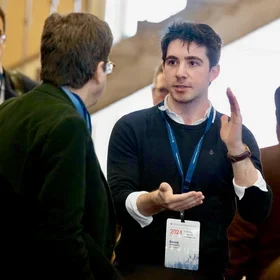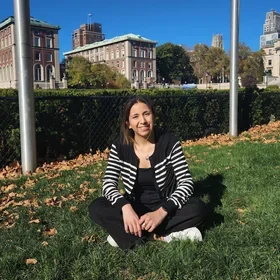Back in 2013, fresh from earning her bachelor’s in computer science from Rutgers University, Catalina Laverde was desperate to secure a job before her student visa from her native Colombia expired. She found herself at a three-day seminar for women trying to break into a male-dominated field.
“It was like a three-day bootcamp on a variety of skills—how to interview, how to answer programming questions and negotiate your salary,” she recalled. “I remember I had a class on how to shake hands. For an hour. How to look someone in the eye. Because back then, diversity and inclusion were not the topics of conversation they are today. You had to adapt and modify the way you presented yourself into the culture.”
When a recruiter from Spotify came to present on the final day of the program, touting the Swedish company’s commitment to gender equality and hiring female programmers, Laverde saw her opportunity.
“I went over there with my newly acquired handshake skills, and I got an interview,” she said with a laugh.
Laverde scored an internship with the streaming service that soon led to a full-time role on the engineering team and the start of a career devoted to diversity and inclusion in the tech industry. Now a senior software engineer, she is taking her advocacy to a new level as a candidate in the Executive Master of Science in Technology Management program at the Columbia School of Professional Studies.
“Women represent only 25% of people in technology,” she said. “Only 2% of those are Latina women—and the numbers in leadership are even lower. I’m the only Latina woman in the student cohort. So, there’s a real lack of representation.”
Laverde had long wanted to get a graduate degree but concluded that a master’s in computer science would not give her the management skills she needed to reach a level of leadership to make a significant impact. “I wanted the degree to be in something that had purpose and meaning,” she said, “that I could immediately incorporate into my career and that I could use to fuel my passions.”
Deciding that an MBA was “too general,” she explored technology management master’s programs at both Columbia and NYU. When the admissions team at Columbia urged her to apply for the executive-level program, the mentorship component made it an easy choice. Now, three months into the program, Laverde is delighted with the experience, particularly with how quickly she has been able to apply what she is learning.
“I’m making changes on my team, and just yesterday I talked with my manager about some of the interview questions we ask candidates,” she said. “I told him, ‘I have some really good suggestions that I just learned in school!’ I love that aspect of the program, that I get to put things to work right away.”
She has also been impressed with the program’s clear emphasis on personal relationships and humanizing the challenges of managing digital transformation. Recalling Dr. Arthur M. Langer’s lectures from the opening residency program, Laverde said she was struck by the way he described the executives whose fateful decisions led their organizations to become cautionary case studies in digital disruption.
“You normally think of the CEO and C-level executives as so far removed from you,” she said. “But Dr. Langer helped us to see them as human beings. That unblocks you, in a way. It changed the way I think about the CEO at my own company. I may not interact with him, but now I’m analyzing what he’s saying and doing almost like he’s a peer, and that makes me more critical and able to imagine how I might do things differently. Before, I wouldn’t have even questioned how I would handle those situations.”
Having recently connected with her mentor, Laverde marveled at the apparent effort behind matching them.
“The program does a very good job of making sure your mentor is not only a skills match but somebody you’re actually going to relate and connect with at a human level,” she said. “That has blown my mind. I don’t know how they managed to do that, because we haven’t even met in person! They really take the time to understand each student. I get the feeling that they are invested in my growth and that just motivates me so much.”
Even as she adjusts to the rigorous schedule, Laverde has been thrilled with the intellectual challenge and the chance to learn more about her “areas of improvement.” And she is especially excited to work with her mentor on her thesis project, a mobile-based platform for empowering women to travel solo.
“I’m approaching it from a safety perspective, because that is the number one reason women don’t venture out into the world alone,” she said. “We don’t feel safe in the world generally, and that sentiment won’t change overnight. So, how can we help women conquer their fears through technology?” Laverde hopes that her studies in the Technology Management program will help her refine and implement this idea into a useful tool for female travelers.
Learn more about the Executive M.S. in Technology Management program.


